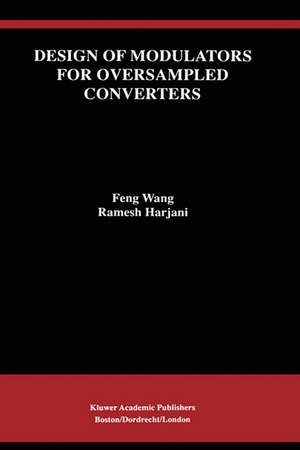Design of Modulators for Oversampled Converters: The Springer International Series in Engineering and Computer Science, cartea 430
Autor Feng Wang, Ramesh Harjanien Limba Engleză Hardback – 30 noi 1997
Unfortunately, there has been no systematic study of the optimal design of modulators for oversampled converters. Design has generally focused on new architectures with little attention being paid to optimization.
The goal of Design of Modulators for Oversampled Converters is to develop a methodology for the optimal design of modulators in oversampled converters. The primary focus of the presentation is on minimizing power consumption and understanding and limiting the nonlinearities that result in such converters.
Design of Modulators for Oversampled Converters offers a quantitative justification for the various design tradeoffs and serves as a guide for designing low-power highly linear oversampled converters. Design of Modulators for Oversampled Converters will serve as a valuable guide for circuit design practitioners, university researchers and graduate students who are interested in this fast-moving area.
| Toate formatele și edițiile | Preț | Express |
|---|---|---|
| Paperback (1) | 634.32 lei 6-8 săpt. | |
| Springer Us – 26 oct 2012 | 634.32 lei 6-8 săpt. | |
| Hardback (1) | 640.37 lei 6-8 săpt. | |
| Springer Us – 30 noi 1997 | 640.37 lei 6-8 săpt. |
Din seria The Springer International Series in Engineering and Computer Science
- 24%
 Preț: 1041.97 lei
Preț: 1041.97 lei - 20%
 Preț: 643.50 lei
Preț: 643.50 lei - 18%
 Preț: 1225.62 lei
Preț: 1225.62 lei - 18%
 Preț: 965.02 lei
Preț: 965.02 lei - 20%
 Preț: 646.12 lei
Preț: 646.12 lei - 18%
 Preț: 948.79 lei
Preț: 948.79 lei - 20%
 Preț: 646.62 lei
Preț: 646.62 lei - 15%
 Preț: 637.46 lei
Preț: 637.46 lei - 20%
 Preț: 643.83 lei
Preț: 643.83 lei - 18%
 Preț: 949.23 lei
Preț: 949.23 lei - 20%
 Preț: 644.48 lei
Preț: 644.48 lei - 20%
 Preț: 994.92 lei
Preț: 994.92 lei - 20%
 Preț: 645.97 lei
Preț: 645.97 lei - 18%
 Preț: 946.87 lei
Preț: 946.87 lei - 20%
 Preț: 995.57 lei
Preț: 995.57 lei - 18%
 Preț: 956.99 lei
Preț: 956.99 lei - 20%
 Preț: 644.98 lei
Preț: 644.98 lei - 15%
 Preț: 649.54 lei
Preț: 649.54 lei - 18%
 Preț: 950.21 lei
Preț: 950.21 lei - 18%
 Preț: 1221.38 lei
Preț: 1221.38 lei - 18%
 Preț: 957.62 lei
Preț: 957.62 lei - 15%
 Preț: 643.99 lei
Preț: 643.99 lei - 18%
 Preț: 948.47 lei
Preț: 948.47 lei - 18%
 Preț: 947.35 lei
Preț: 947.35 lei - 20%
 Preț: 1284.65 lei
Preț: 1284.65 lei - 20%
 Preț: 1628.31 lei
Preț: 1628.31 lei - 20%
 Preț: 1285.78 lei
Preț: 1285.78 lei
Preț: 640.37 lei
Preț vechi: 753.39 lei
-15% Nou
Puncte Express: 961
Preț estimativ în valută:
122.54€ • 128.26$ • 101.99£
122.54€ • 128.26$ • 101.99£
Carte tipărită la comandă
Livrare economică 31 martie-14 aprilie
Preluare comenzi: 021 569.72.76
Specificații
ISBN-13: 9780792380634
ISBN-10: 0792380630
Pagini: 148
Ilustrații: XVII, 148 p.
Dimensiuni: 155 x 235 x 11 mm
Greutate: 0.42 kg
Ediția:1998
Editura: Springer Us
Colecția Springer
Seria The Springer International Series in Engineering and Computer Science
Locul publicării:New York, NY, United States
ISBN-10: 0792380630
Pagini: 148
Ilustrații: XVII, 148 p.
Dimensiuni: 155 x 235 x 11 mm
Greutate: 0.42 kg
Ediția:1998
Editura: Springer Us
Colecția Springer
Seria The Springer International Series in Engineering and Computer Science
Locul publicării:New York, NY, United States
Public țintă
ResearchCuprins
1. Fundamentals of Oversampled A/D Converters.- 1.1 Oversampled converters.- 1.2 Nonidealities in delta-sigma modulators.- 1.3 Conclusions.- 2. Opamp Topologies for Oversampled Converters.- 2.1 Introduction.- 2.2 Class A opamps: an improved slewing model.- 2.3 A new class AB opamp: principle and design.- 2.4 Transient behavior of Class AB opamps.- 2.5 Dynamic opamps: slewing, settling and power issues.- 2.6 Conclusions.- 3. Optimal Design of Opamps for Oversampled Modulators.- 3.1 Introduction.- 3.2 Opamp classification.- 3.3 A general SC-integrator model.- 3.4 Models for power consumption.- 3.5 Comparison of power consumption.- 3.6 Design for optimization.- 3.7 Conclusions.- 4. Nonlinear Settling in Delta-Sigma Modulators.- 4.1 Introduction.- 4.2 Framework development.- 4.3 Nonlinear settling error.- 4.4 Conclusions.- 5. Other Nonlinear Phenomena in Delta-Sigma Modulators.- 5.1 Introduction.- 5.2 Nonlinear capacitor error.- 5.3 Nonlinear reference voltage error.- 5.4 Nonlinear DC gain error.- 5.5 Power saving strategies.- 5.6 Conclusions.- 6. Circuit Implementation of Delta-Sigma Modulators.- 6.1 Introduction.- 6.2 System overview.- 6.3 Integrator design.- 6.4 Opamp design.- 6.5 Comparator design.- 6.6 Digital control and clock.- 6.7 Experimental results.- 6.8 Conclusions.- 7. Conclusions.- 7.1 Contribution.- 7.2 Conclusions.- References.













